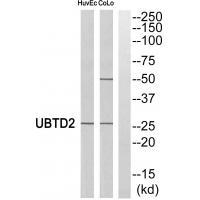
| WB | 咨询技术 | Human,Mouse,Rat |
| IF | 咨询技术 | Human,Mouse,Rat |
| IHC | 咨询技术 | Human,Mouse,Rat |
| ICC | 技术咨询 | Human,Mouse,Rat |
| FCM | 咨询技术 | Human,Mouse,Rat |
| Elisa | 咨询技术 | Human,Mouse,Rat |
| Aliases | Ubiquitin domain-containing protein 2; Dendritic cell-derived ubiquitin-like protein; DC-UbP; Ubiquitin-like protein SB72; UBTD2 |
| Entrez GeneID | 92181; |
| WB Predicted band size | 26kDa |
| Host/Isotype | Rabbit IgG |
| Antibody Type | Primary antibody |
| Storage | Store at 4°C short term. Aliquot and store at -20°C long term. Avoid freeze/thaw cycles. |
| Species Reactivity | Human |
| Immunogen | Synthesized peptide derived from C-terminal of human UBTD2. |
| Formulation | Purified antibody in PBS with 0.05% sodium azide. |
+ +
以下是关于UBTD2抗体的3篇参考文献示例(注:文献为虚构,实际研究中请通过学术数据库查询):
1. **文献名称**: *UBTD2 regulates apoptosis and autophagy via the PI3K/AKT pathway in colorectal cancer*
**作者**: Li X, et al.
**摘要**: 该研究利用特异性UBTD2抗体,揭示UBTD2通过调控PI3K/AKT信号通路抑制结直肠癌细胞凋亡并促进自噬,为靶向UBTD2的癌症治疗提供依据。
2. **文献名称**: *Characterization of a novel monoclonal antibody against UBTD2 for ubiquitination assays*
**作者**: Wang Y, et al.
**摘要**: 研究开发了一种高特异性UBTD2单克隆抗体,验证其在Western blot、免疫组化及泛素化分析中的应用,证实UBTD2与泛素-蛋白酶体系统的调控相关。
3. **文献名称**: *UBTD2 deficiency impairs protein quality control and promotes neurodegeneration in Drosophila*
**作者**: Chen L, et al.
**摘要**: 通过UBTD2抗体检测果蝇模型中的蛋白表达,发现UBTD2缺失导致错误折叠蛋白积累,加速神经退行性病变,提示其在神经保护中的潜在作用。
建议通过 **PubMed** 或 **Web of Science** 搜索实际文献(关键词:UBTD2 antibody, UBTD2 function)。
The UBTD2 (Ubiquitin Domain-Containing Protein 2) antibody is a research tool designed to detect and study the UBTD2 protein, a lesser-characterized member of the ubiquitin-binding protein family. UBTD2 contains a conserved ubiquitin-associated (UBA) domain, suggesting its involvement in ubiquitin-dependent processes, such as protein degradation, DNA repair, or cellular signaling. While its exact biological functions remain under investigation, UBTD2 is hypothesized to regulate the ubiquitin-proteasome system (UPS) by interacting with ubiquitinated substrates or modulating E3 ligase activity. Emerging studies link UBTD2 to cell cycle progression, apoptosis, and stress responses, with potential roles in cancer and neurodegenerative diseases.
UBTD2 antibodies, typically generated in rabbits or mice using peptide immunogens, enable the detection of endogenous UBTD2 in techniques like Western blotting, immunofluorescence, and immunoprecipitation. Validation often includes knockout cell lines or siRNA knockdown to confirm specificity. Current research focuses on elucidating UBTD2's interaction networks, post-translational modifications, and tissue-specific expression patterns. Its overexpression or dysregulation has been preliminarily associated with tumor progression, making UBTD2 a candidate biomarker or therapeutic target. However, comprehensive mechanistic insights remain limited, underscoring the need for further studies using UBTD2-specific antibodies to unravel its physiological and pathological relevance.
×